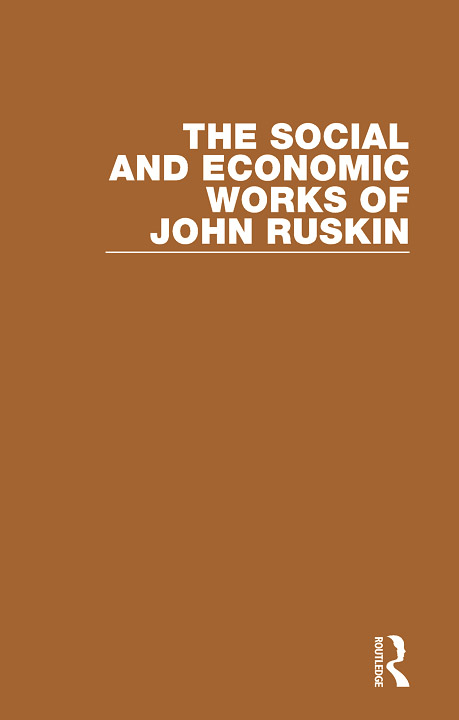
The Social and Economic Works of John Ruskin
By John Ruskin
- Published: 1994
- DOI: 10.4324/9780415113502
- Set ISBN: 9780415113502
Set Contents
Time and Tide, by Weare and Tyne
- By
- John Ruskin
Volume Contents
-
Front Matter
-
Introduction By Peter Cain
-
Bibliographical Note
-
Prelims
-
Preface
-
Letter I: The two kinds of Co-operation.—In its highest sense it is not yet thought of
-
Letter II: Co-operation, as hitherto understood, is perhaps not expedient
-
Letter III: Of True Legislation. That every Man may be a Law to himself
-
Letter IV: The Expenses for Art and for War
-
Letter V: The Corruption of Modern Pleasure.—(Covent Garden Pantomime.)
-
Letter VI: The Corruption of Modern Pleasure.—(The Japanese Jugglers.)
-
Letter VII: Of the various Expressions of National Festivity
-
Letter VIII: The Four possible Theories respecting the Authority of the Bible
-
Letter IX: The Use of Music and Dancing under the Jewish Theocracy, compared with their Use by the Modern French
-
Letter X: The Meaning, and Actual Operation of Satanic or Demoniacal Influence
-
Letter XI: The Satanic Power is mainly Twofold; the Power of causing Falsehood and the Power of causing Pain. The Resistance is by Law of Honour and Law of Delight
-
Letter XII: The Necessity of Imperative Law to the Prosperity of States
-
Letter XIII: The Proper Offices of the Bishop and Duke ; or, “Overseer” and “Leader.”
-
Letter XIV: The First Group of Essential Laws. — Against Theft by False Work, and by Bankruptcy.— Necessary Publicity of Accounts
-
Letter XV: The Nature of Theft by Unjust Profits.—Crime can finally be arrested only by Education
-
Letter XVI: Of Public Education irrespective of Class-distinction. It consists essentially in giving Habits of Mercy, and Habits of Truth. (Gentleness * and Justice.)
-
Letter XVII: The Relations of Education to Position in Life
-
Letter XVIII: The harmful Effects of Servile Employments. The possible Practice and Exhibition of sincere Humility by Religious Persons
-
Letter XIX: The General Pressure of Excessive and Improper Work, in English Life
-
Letter XX: Of Improvidence in Marriage in the Middle Classes ; and of the advisable Restrictions of it
-
Letter XXI: Of the Dignity of the Four Fine Arts; and of the Proper System of Retail Trade
-
Letter XXII: Of the normal Position and Duties of the Upper Classes. General Statement of the Land Question
-
Letter XXIII: Of the Just Tenure of Lands: and the proper Functions of high Public Officers
-
Letter XXIV: The Office of the Soldier
-
Letter XXV: Of inevitable Distinction of Rank, and necessary Submission to Authority. The Meaning of Pure-Heartedness. Conclusion
-
Back Matter